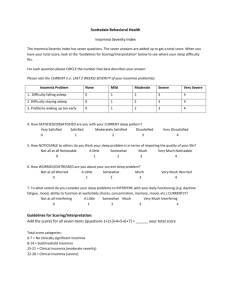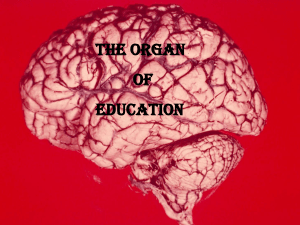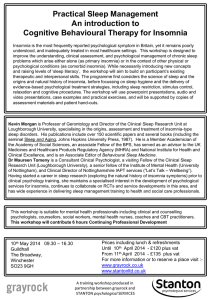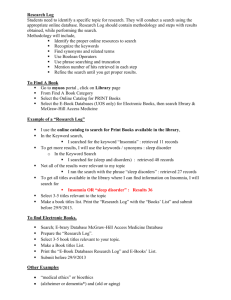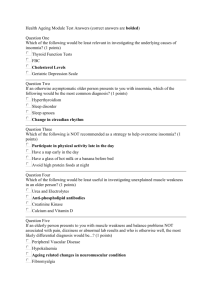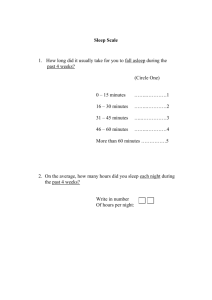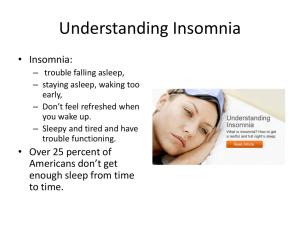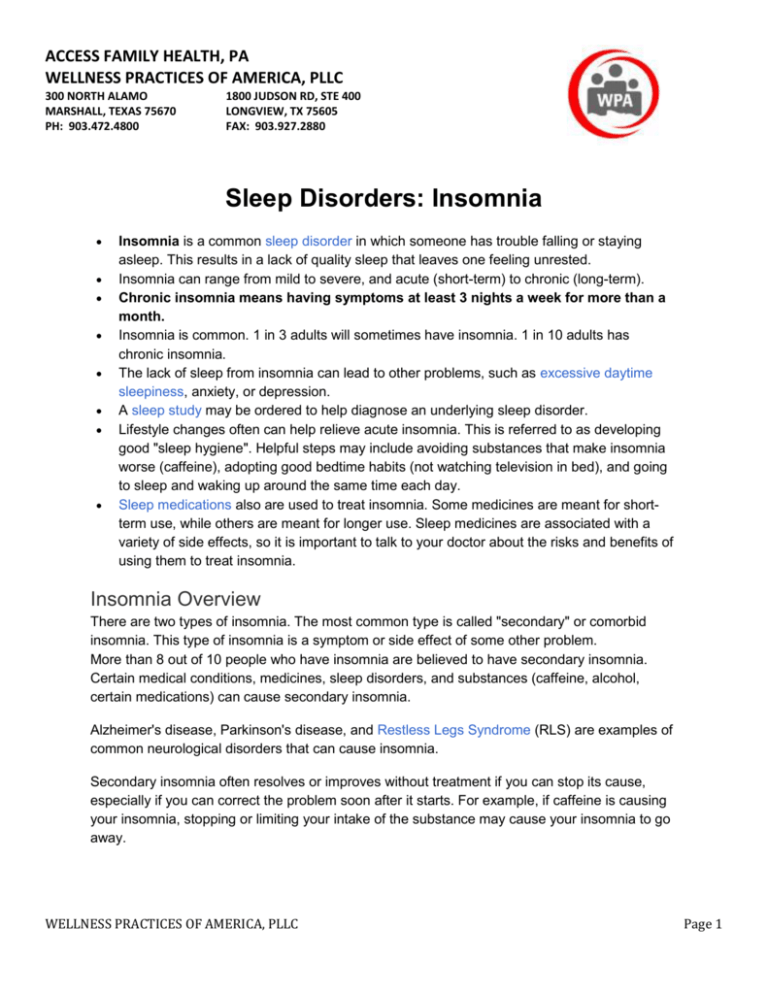
ACCESS FAMILY HEALTH, PA
WELLNESS PRACTICES OF AMERICA, PLLC
300 NORTH ALAMO
MARSHALL, TEXAS 75670
PH: 903.472.4800
1800 JUDSON RD, STE 400
LONGVIEW, TX 75605
FAX: 903.927.2880
Sleep Disorders: Insomnia
Insomnia is a common sleep disorder in which someone has trouble falling or staying
asleep. This results in a lack of quality sleep that leaves one feeling unrested.
Insomnia can range from mild to severe, and acute (short-term) to chronic (long-term).
Chronic insomnia means having symptoms at least 3 nights a week for more than a
month.
Insomnia is common. 1 in 3 adults will sometimes have insomnia. 1 in 10 adults has
chronic insomnia.
The lack of sleep from insomnia can lead to other problems, such as excessive daytime
sleepiness, anxiety, or depression.
A sleep study may be ordered to help diagnose an underlying sleep disorder.
Lifestyle changes often can help relieve acute insomnia. This is referred to as developing
good "sleep hygiene". Helpful steps may include avoiding substances that make insomnia
worse (caffeine), adopting good bedtime habits (not watching television in bed), and going
to sleep and waking up around the same time each day.
Sleep medications also are used to treat insomnia. Some medicines are meant for shortterm use, while others are meant for longer use. Sleep medicines are associated with a
variety of side effects, so it is important to talk to your doctor about the risks and benefits of
using them to treat insomnia.
Insomnia Overview
There are two types of insomnia. The most common type is called "secondary" or comorbid
insomnia. This type of insomnia is a symptom or side effect of some other problem.
More than 8 out of 10 people who have insomnia are believed to have secondary insomnia.
Certain medical conditions, medicines, sleep disorders, and substances (caffeine, alcohol,
certain medications) can cause secondary insomnia.
Alzheimer's disease, Parkinson's disease, and Restless Legs Syndrome (RLS) are examples of
common neurological disorders that can cause insomnia.
Secondary insomnia often resolves or improves without treatment if you can stop its cause,
especially if you can correct the problem soon after it starts. For example, if caffeine is causing
your insomnia, stopping or limiting your intake of the substance may cause your insomnia to go
away.
WELLNESS PRACTICES OF AMERICA, PLLC
Page 1
In contrast, primary insomnia isn't due to a medical problem, medicines, or other substances. It
is its own disorder. A number of life changes can trigger primary insomnia, including long-lasting
stress and emotional upset.
Insomnia can cause excessive daytime sleepiness and a lack of energy. It also can make you
feel anxious, depressed, or irritable. You may have trouble focusing on tasks, paying attention,
learning, and remembering. This can prevent you from doing your best at work or school.
Insomnia also can cause other serious problems. For example, you may feel drowsy while
driving, which could lead to an accident.
Who Is At Risk for Insomnia?
Insomnia is a common disorder. One in 3 adults has insomnia sometimes. One in 10 adults has
chronic insomnia. It tends to afflict women more often than men. The condition can occur at any
age. However, older adults are more likely to have insomnia than younger people.
People who may be at higher risk for insomnia include those who:
Have a lot of stress.
Are depressed or who have other emotional distress, such as divorce or death of a spouse.
Have lower incomes.
Work at night or have frequent major shifts in their work hours.
Travel long distances with time changes.
Have certain medical conditions or sleep disorders that can disrupt sleep.
Have an inactive lifestyle.
What Are the Signs and Symptoms of Insomnia?
The main symptom of insomnia is trouble falling and/or staying asleep, which leads to lack of
sleep. If you have insomnia, you may:
Lie awake for a long time before you fall asleep
Sleep for only short periods
Be awake for much of the night
Feel as if you haven't slept at all
Wake up too early
The lack of sleep also can cause other symptoms. You may wake up feeling tired or not wellrested, and you may feel tired during the day. You also may have trouble focusing on tasks.
Insomnia can cause you to feel anxious, depressed, or irritable.
Insomnia may affect your daily activities and cause serious problems. For example, you may
feel drowsy while driving. Driving while sleepy leads to more than 100,000 car crashes each
year. In older women, research shows that insomnia raises the risk of falling.
WELLNESS PRACTICES OF AMERICA, PLLC
Page 2
How Is Insomnia Diagnosed?
Your doctor will ask questions about your sleep and medical history and perform a physical
exam. He or she also may recommend a sleep study. For example, you may have a sleep study
if the cause of your insomnia is unclear.
Sleep History
To get a better sense of your sleep problem, your doctor will ask you details about your sleep
habits. Before your visit, think about how to describe your problems, including:
How often you have trouble sleeping and how long you've had the problem?
When you go to bed and get up on workdays and days off?
How long it takes you to fall asleep, how often you wake up at night, and how long it takes
to fall back asleep?
Whether you snore loudly and often or wake up gasping or feeling out of breath?
How refreshed you feel when you wake up, and how tired you feel during the day?
How often you doze off or have trouble staying awake during routine tasks, especially
driving?
To find out what's causing or worsening your insomnia, your doctor also may ask you:
Whether you worry about falling asleep, staying asleep, or getting enough sleep
What you eat or drink, and whether you take medicines before going to bed
What routine you follow before going to bedWhat the noise level, lighting, and temperature
are like where you sleep
What distractions, such as a TV or computer, are in your bedroom
To help your doctor, consider keeping a sleep diary for 1 or 2 weeks. Write down when you go
to sleep, wake up, and take naps. (For example, you might note: Went to bed at 10 a.m.; woke
up at 3 a.m. and couldn't fall back asleep; napped after work for 2 hours.)
Also write down how much you sleep each night, as well as how sleepy you feel at various
times during the day.
Sleep Studies
Your doctor may recommend a sleep study called a polysomnogram (PSG) if he or she thinks
an underlying sleep disorder is causing your insomnia. A Polysomnogram usually is done while
you stay overnight at a sleep center. It records brain electrical activity, eye movements, heart
rate, breathing, muscle activity, blood pressure, and blood oxygen levels while you are asleep.
What are the Treatments for Insomnia?
WELLNESS PRACTICES OF AMERICA, PLLC
Page 3
Lifestyle changes often can help relieve acute (short-term) insomnia. These changes may make
it easier to fall asleep and stay asleep.
A type of counseling called cognitive-behavioral therapy (CBT) can help relieve the anxiety
linked to chronic (ongoing) insomnia. Anxiety tends to prolong insomnia.
Several sleep medicines also can help relieve insomnia and re-establish a regular sleep
schedule. However, if your insomnia is the symptom or side effect of another problem, it's
important to treat the underlying cause (if possible). Your doctor also may prescribe medicine to
help treat your insomnia.
Cognitive-Behavioral Therapy
CBT for insomnia targets the thoughts and actions that can disrupt sleep. This therapy
encourages good sleep habits and uses several methods to relieve sleep anxiety. For example,
relaxation techniques and biofeedback are used to reduce anxiety. These strategies help you
better control your breathing, heart rate, muscles, and mood.
CBT also aims to replace sleep anxiety with more positive thinking that links being in bed with
being asleep. This method also teaches you what to do if you're unable to fall asleep within a
reasonable time.
CBT also may involve talking with a therapist one-on-one or in group sessions to help you
consider your thoughts and feelings about sleep. This method may encourage you to describe
thoughts racing through your mind in terms of how they look, feel, and sound. The goal is for
your mind to settle down and stop racing.
CBT also focuses on limiting the time you spend in bed while awake. This method involves
setting a sleep schedule. At first, you will limit your total time in bed to the typical short length of
time you're usually asleep.
This schedule might make you even more tired because some of the allotted time in bed will be
taken up by problems falling asleep. However, the resulting tiredness is intended to help you get
to sleep more quickly. Over time, the length of time spent in bed is increased until you get a full
night of sleep.
For success with CBT, you may need to see a therapist who is skilled in this approach weekly
over 2 to 3 months. CBT works as well as prescription medicine for many people who have
chronic insomnia. It also may provide better long-term relief than medicine alone.
For people who have insomnia and major depressive disorder, CBT combined with
antidepression medicines has shown promise in relieving both conditions.
WELLNESS PRACTICES OF AMERICA, PLLC
Page 4
Prescription Sleep Medications
There are several prescription sleep medication available for the treatment of insomnia. Some
are meant for short-term use, while others are meant for long-term use.
Talk to your doctor about the benefits and side effects of insomnia medicines. For instance,
insomnia medicines can help you fall asleep, but some people may feel groggy in the morning
after taking them. Some insomnia medicines may be habit forming.
Rare side effects of these medicines include sleep eating, sleep walking, or driving while asleep.
If you have side effects from an insomnia medicine, or if it doesn't work well, tell your doctor. He
or she might prescribe a different medicine.
Some insomnia medicines can be habit forming. Ask your doctor about the benefits and risks of
insomnia medicines.
Over-the-Counter Sleep Medications
Some over-the-counter (OTC) products claim to treat insomnia. These products include
melatonin, L-tryptophan supplements, and valerian teas or extracts. The Food and Drug
Administration doesn't regulate “natural” products and some food supplements. Thus, the dose
and purity of these substances can vary. How well these products work and how safe they are
isn't well understood.
Some over-the-counter sleep medications that contain antihistamines, such as
diphenhydramine (Benadryl) are marketed as "sleep aids". These products may make you
sleepy, but they pose risks for some people. They also may not offer the best treatment for your
insomnia. Your doctor can advise you whether these products can benefit you.
Lifestyle Changes to Promote Sleep
If you have insomnia, avoid substances that make it worse, such as:
Caffeine, tobacco, and other stimulants taken too close to bedtime. Their effects can last as
long as 8 hours.
Certain over-the-counter and prescription medicines that can disrupt sleep (for example,
some cold and allergy medicines). Talk to your doctor about which medicines won't disrupt
your sleep.
Alcohol. An alcoholic drink before bedtime may make it easier for you to fall asleep.
However, alcohol triggers sleep that tends to be lighter than normal. This makes it more
likely that you will wake up during the night.
WELLNESS PRACTICES OF AMERICA, PLLC
Page 5
Try to adopt good bedtime habits that make it easier to fall asleep and stay asleep. Follow a
routine that helps you wind down and relax before bed. For example, read a book, listen to
soothing music, or take a hot bath.
Try to schedule your daily exercise at least 5 to 6 hours before going to bed. Don't eat heavy
meals or drink a lot before bedtime.
Make your bedroom sleep-friendly. Avoid bright lighting while winding down. Try to limit possible
distractions, such as a TV, computer, or pet. Make sure the temperature of your bedroom is cool
and comfortable. Your bedroom also should be dark and quiet.
Go to sleep around the same time each night and wake up around the same time each morning,
even on weekends. If you can, avoid night shifts, alternating schedules, or other things that may
disrupt your sleep schedule.
_____________________________________________________________
© 2010 Vivacare. Last updated March 25, 2012.
Reference: The National Institute of Neurological Disorders and Stroke (NINDS)
All rights reserved. Any redistribution or reproduction of part or all of the contents in any form is
prohibited. You may not, except with our express written permission, distribute, reproduce, or
commercially exploit the content.
This information is for general educational uses only. It may not apply to you and your
personal medical needs. This information should not be used in place of a visit, call,
consultation with or the advice of your physician or health care professional.
Communicate promptly with your physician or other health care professional with any
health-related questions or concerns.
Be sure to follow specific instructions given to you by your physician or health care
professional.
From Your Doctor service powered by Vivacare.
WELLNESS PRACTICES OF AMERICA, PLLC
Page 6

